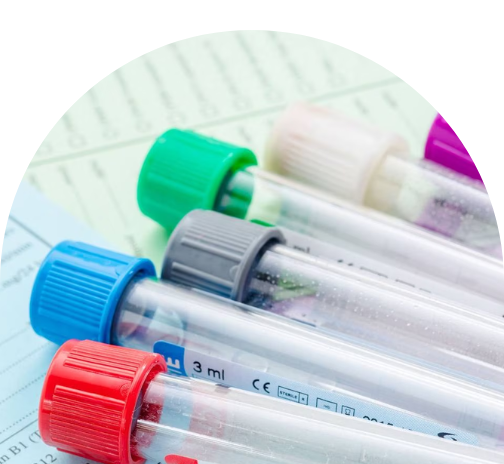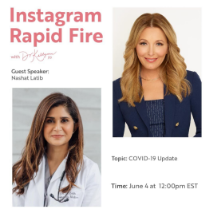Understand the Numbers to Optimize Getting Pregnant Naturally or with IVF
When seeking pregnancy, either naturally or through IVF, it’s critical to understand your fertility numbers through lab tests. When we work with fertility patients in our clinic, we ensure they get the right labs so we can customize their plans to prepare their bodies for a successful and healthy pregnancy.
You can’t fix what you don’t understand.
When you’re aware of and understand what your current numbers tell you about your body, your nutrient levels, and your hormones, you become empowered to make the necessary changes that can help support these levels and optimize your chance to get (and stay) pregnant.
As you read this, you may want to have your own labs handy to better understand what you may be missing or what numbers may need some support. If you don’t have labs, consider getting the support of a functional medicine expert to help you navigate the process (we’d love to support you!).
Remember, we look at these labs through a different lens compared to your traditional medical doctor. We put them in the context of fertility, which is very different from just paying attention to “normal reference ranges” as these are not necessarily what is actually optimal for a healthy pregnancy.
This is just one of the things that makes a functional medicine doctor different from a traditional medical doctor.
It’s important to us that you understand every one of these levels from a fertility viewpoint so you can avoid unnecessary treatment (saving thousands of dollars!) and have the tools needed to get your body ready for pregnancy!
Remember, you can’t fix what you don’t understand, so let’s dive in.
What labs do I need to look at?
When looking at your overall fertility, the labs we like to look at in our patients are “Day 3 Labs”, “Day 21 labs”, and other basic labs. We find that having this full panel of labs helps us understand where our patients need our most support. Here’s a full list of the labs we recommend:
- “Day 3” Labs: FSH, estradiol, LH, prolactin, AMH, and full thyroid panel (TSH, FT3, FT4, TPO, TG antibodies)
- “Day 21” Labs: Progesterone Labs, taken 7 days after ovulation, i.e., on or around day 21 of cycle
- Other Essential labs include: CBC, CMP, GGT, HbA1C, insulin, homocysteine, hsCRP, DHEA-S, testosterone, SHBG, iron profile, ferritin, lipid Panel, 25-OH vitamin D
It may seem like a lot to digest, but don’t worry! We’re going to break down each one and why it matters below. And remember, a functional medicine practitioner can walk you through getting these tests, and we would be happy to educate you further!
Day 3 Labs
Day 3 Labs are taken on day three of your menstrual cycle (day 1 is considered the first full day of bleeding). In order to fully understand the most accurate picture of your fertility, it’s important these labs are taken between days two to four of your cycle.
These labs include: FSH, estradiol, LH, prolactin, AMH, as well as the necessary thyroid labs we’ll go over below.
FSH: Follicle-Stimulating Hormone
Optimal Level for Fertility: 4-7
The normal range for FSH is considered at less than 10. However, we know that the optimal range for pregnancy is from level four to seven. Anything over 10 usually indicates poor egg quality, which can potentially lead to difficulty with implantation, low progesterone levels, and many other issues, including indicating your ovaries are responding negatively to stress.
The good news is high levels of FSH CAN improve and become optimal for fertility. With targeted support, this number can come down closer to the optimal level and allow for conception. We have those clients with suboptimal FSH levels who follow our 4R Fertility FormulaTM to get them ready for conception.
We use our proprietary, clinically proven protocols, in addition to supporting every aspect of our clients’ lifestyles, including those things that impact our physical, mental, and emotional health. We find that this comprehensive approach allows us to support those that have “normal” labs yet cannot get pregnant, as well as those that have lab values out of the norm.
If you’re curious to learn more about how we work with our clients, click HERE to register for our on-demand masterclass to discover our proprietary 4R Fertility FormulaTM.
Estradiol
Optimal Level for Fertility: 30-50
Estradiol is the hormone that helps support the healthy development of a follicle.
Pay attention, because this is one of the hormones where the normal range on lab tests doesn’t always correlate with what is optimal for fertility. If your estradiol is too low, there’s not a strong enough signal to allow ovulation.
On the flip side, when estradiol is too high, you may have significant premenstrual syndrome symptoms, such as moodiness, heavy or dysfunctional bleeding, and lots of cramping, which we know is no fun!
LH: Luteinizing Hormone
Optimal Level for Fertility: Less than 7
This hormone is released from the brain and communicates with the ovaries to ovulate. If you’ve ever taken an over-the-counter urine ovulation test, you’re measuring this. We often look at the ratio of LH: FSH to give us a better idea of what is going on.
Prolactin
Optimal Level for Fertility: Less than 12
Prolactin is another hormone where the normal range doesn’t indicate the best results for fertility.
Prolactin is important because an elevated level can suppress ovulation and can even indicate a benign tumor. PCOS and hypothyroidism can also lead to elevated prolactin levels.
AMH: Anti-Mullerian Hormone
Optimal Level for Fertility: 2-4
This hormone gives us an idea of how many eggs you have on reserve. Usually, for a Reproductive Endocrinologist to recommend IVF, your AMH level should be about 1.
The sad thing is that many women don’t feel like there’s a chance that they can even get pregnant if their AMH is less than 1, which is simply not true.
This is where looking at your fertility through a functional medicine lens can really help you. With the functional medicine approach to fertility, we don’t need you to have a ton of eggs as they do need for IVF. To optimize your chances of natural fertility, you just need ONE good quality egg.
It’s important to remember that most of these numbers aren’t hard and fast numbers that can’t be changed. We know that our overall health, as well as our reproductive health, is malleable or changeable. This is why we have so much success supporting our clients who are ready to do the work and follow our simple, stepwise approach. On top of our traditional medical background, we use our functional medicine knowledge to take a completely different approach to infertility.
Thyroid (TSH, FT3, FT4, TPO, TG antibodies) – also taken on Day 3
Optimal Level for Fertility: TSH less than 1.5
Your Thyroid levels fluctuate throughout your cycle, so make sure to get them drawn on Day 3 along with the remainder of the Day 3 Labs to give you the most accurate information about your fertility.
Notice we’re not just interested in your TSH levels, but also the FT3, FT4, TPO, and TG antibodies.
When getting your thyroid labs drawn, we can’t emphasize enough the importance of getting the full panel. We’ve seen too many times that something is missed by other practitioners simply because they’re only looking at the TSH level, when there’s so much more to consider.
It’s critical that these levels be addressed in the preconception period to optimize your chances of getting and staying pregnant.
Day 21 Labs
Progesterone
Optimal Level for Fertility: Greater than 12
For our purposes, you’ll want to have your progesterone labs drawn on day 21 of your cycle (or 7 days after ovulation).
Progesterone gives us an idea of the egg quality, and a level of 12 or higher is the number we strive for.
Sometimes in conventional medicine, they say greater than five implies you’ve ovulated, and less than five means you haven’t.
But again, when we look at progesterone, we’re more interested in the egg quality so that you have the greatest chance of getting (and staying) pregnant!
Other Essential Body and Fertility Labs
HbA1C: Hemoglobin A1C and DHEA-s
Optimal Level for Fertility:
Hemoglobin A1C gives us an idea of what your blood sugars have been running over the last 3 months. Knowing this number plus a fasting insulin level gives you a better idea of what you may need to focus on in your diet and lifestyle to prevent metabolic problems such as insulin resistance and diabetes.
These sorts of issues are extremely important when it comes to fertility and can sometimes give us a better idea of what type of PCOS someone has if they have been given that diagnosis by their doctor.
DHEA-S is a mother hormone to the sex hormones it correlates with infertility. When it’s too low or too high, it can impact fertility and affect egg quality.
Homocysteine
Optimal Level for Fertility: Less than 8
Homocysteine levels give you an idea about the level of inflammation in the body as well as the level of certain vitamins. High homocysteine, which has been correlated with infertility in both males and females, may mean you have a B vitamin or folate deficiency and can increase your risk for certain diseases down the road. It can also mean you may have an inherited defect in one of your genes which could actually explain your underlying struggles with infertility.
Testosterone and SHBG
Optimal Level for Fertility:
These sex hormones are absolutely essential for fertility.
When testosterone levels are too low, our techniques give them a boost to support good healthy egg production and development so you ovulate regularly and increase your ability to conceive.
Testosterone also affects your sex drive, which is obviously essential to getting pregnant.
Your SHBG levels give you an idea of how much hormone is active for use.
Ferritin
Optimal Level for Fertility: 40-100 ng/mL
The ferritin level gives you an idea of the iron stores in your body. This is crucial to many functions in the body and needs to be optimized to increase your chances of getting pregnant.
If you have heavy periods, it may mean that your Iron is low or even depleted, which would require supplementation.
In animal studies, it’s been shown that low iron levels result in significantly lower conception rates. Adequate iron levels help build a nice fluffy endometrium, the inner layer of the uterus that makes a cozy spot for an embryo to latch on to.
25-OH Vitamin D
Optimal Level for Fertility: 50-80
Vitamin D is crucial as it is essential to regulating normal body functions, especially those related to hormonal balance.
It’s an important one to pay attention to because the majority of women tend to be deficient.
Vitamin D helps with gut integrity and supports more important processes throughout the body than we can even name.
Research links Vitamin D deficiency to a number of female reproductive issues, including gestational diabetes, endometriosis, PCOS, uterine myomas, premature Labor, and even preeclampsia.
Vitamin D blood levels of 30 or higher have been associated with greater rates of pregnancy for natural pregnancy and IVF. However, we really like to see it between 50 and 80.
Lipid Panel and AST/ALT/GGT
Optimal Level for Fertility:
Your lipid panel consists of your cholesterol levels such as LDL. HDL, and triglycerides, and are also building blocks for your sex hormones. Lipid levels that are too high or too low have been correlated with infertility.
The CMP panel will include the AST and ALT liver enzymes, and the GGT is another liver enzyme that gives you insight into your toxic load. All of these are important to know in order to understand how well your liver is working and handling all the medications and toxins it is responsible for clearing.
CBC with differential
Optimal Level for Fertility: Can use normal ranges
The CBC is looked at on most basic blood work, and is probably something you have done before. It gives you an idea of your white blood cell count, hemoglobin (your blood count to make sure you aren’t anemic), and your platelets. This test is pretty standard and is looked at in relation to all of the other labs to give you more insight into your overall health and where you may need support for your fertility.
So what does all of this mean?
When you understand your fertility numbers through lab tests, you’ll be able to see the areas that may require more focus and support. You can’t fix what you don’t understand.
By knowing and understanding these basic labs and your hormones, you become empowered to make the necessary changes that can help support these levels and optimize your chance of getting (and staying) pregnant.
Having insight into your body supports you in making decisions about your health and lifestyle that optimize your body’s ability to provide what you want – a healthy and positive pregnancy!
Through our unique approach to infertility, we can uncover the blocks that are keeping you from getting pregnant, help you avoid unnecessary treatment, save you thousands of dollars on fertility drugs and treatments, and give you the tools you need to get your body ready for pregnancy NOW.
We’re here to help you navigate these tests and other questions you may have. It’s part of how we educate and support our clients, and we have space for you in our unique program. Click HERE to register for our on-demand masterclass to discover our proprietary 4R Fertility FormulaTM and how you can work more closely with us to optimize getting pregnant naturally or with IVF.








